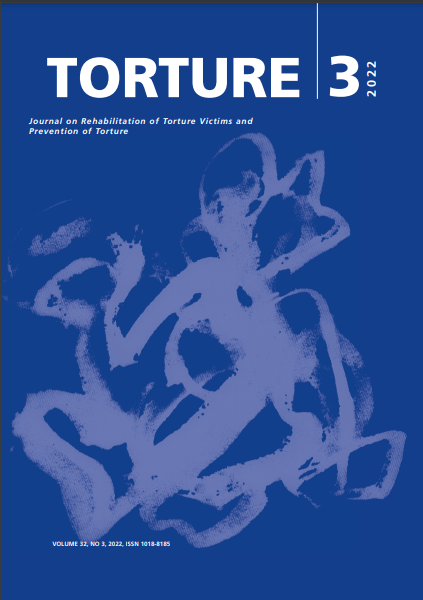Participation of psychologists in Istanbul Protocol based physical examinations: an applied perspective
DOI:
https://doi.org/10.7146/torture.v32i3.128792Keywords:
collaboration, psychologists, physicians, Istanbul Protocol, physical examination, debate, multi-disciplinary team, refugees, tortureAbstract
Being invited to do an evaluation of another asylum seeker, this time one from Turkey, a question kept coming to my mind. The question is as follows: Wouldn’t it be important for mental health professionals to take part in Istanbul Protocol (IP) based physical examinations? The intent is not to do the physical examination, but to be present, observe, ask questions when appropriate, and witness, with the consent of the client. The article elaborates on this question, while both sharing my perspective as a clinical psychologist and referring to relevant literature.
References
Abu Akar, F., Arbel, R., Benninga, Z., Dia, M. A., & Steiner-Birmanns, B. (2014). The Istanbul protocol (manual on the effective investigation and documentation of torture and other cruel, inhuman or degrading treatment or punishment): implementation and education in Israel. The Israel Medical Association Journal, 16(3), 137–141. http://europepmc.org/abstract/med/24761699
AbuDagga, A., Carome, M., & Wolfe, S. M. (2019). Time to end physician sexual abuse of patients: Calling the U.S. medical Community to action. Journal of General Internal Medicine 2019 34:7, 34(7), 1330–1333. https://doi.org/10.1007/S11606-019-05014-6
Alameer, A., Mohammed, A., Elwahab, S. A., Boland, M., Elfadul, A., Tiwary, T., Power, C., Allen, M., Butt, A., & Hill, A. (2021). Documentation of chaperone presence in breast clinic, a complete audit cycle. Irish Journal of Medical Science, 1–3. https://doi.org/10.1007/S11845-021-02634-Y
Alessi, M. G., & Bennett, J. M. (2020). Mental health is the health of the whole body: How psychoneuroimmunology & health psychology can inform & improve treatment. Journal of Evaluation in Clinical Practice, 26(5), 1539–1547. https://doi.org/10.1111/JEP.13386
American Medical Association. (n.d.). Code of Medical Ethics Opinion 1.2.4: Use of chaperones. American Medical Association. Retrieved September 24, 2021, from https://www.ama-assn.org/delivering-care/ethics/use-chaperones
Anikwe, C. C., Irechukwu, C. J., Ogah, C. O., Ikeoha, C. C., Okorochukwu, B. C., Okoroafor, F. C., & Ndukwe, O. E. (2021). Presence of chaperone during pelvic examination: Women’s opinions and preferences in a tertiary hospital in Abakaliki, Ebonyi State, Nigeria. Journal of Clinical & Diagnostic Research, 15(4), 1–4. https://doi.org/10.7860/JCDR/2021/46850.14705
Gergerich, E., Boland, D., & Scott, M. A. (2018). Hierarchies in interprofessional training. Journal of Interprofessional Care, 33(5), 528–535. https://doi.org/10.1080/13561820.2018.1538110
Hoffman, J. S., & Koocher, G. P. (2018). Strategies for ethical practice in medical settings. Practice Innovations, 3(1), 43–55. https://doi.org/10.1037/PRI0000062
Holloway, R. L., & David, A. K. (2005). The complexion of collaboration: An overview of the psychologist-physician relationship. Clinical Case Studies, 4(2), 115–125. https://doi.org/10.1177/1534650103259756
Hook, K., & Vera, E. (2020). Best practices in Global Mental Health: An exploratory study of recommendations for psychologists. International Perspectives in Psychology: Research, Practice, Consultation, 9(2), 67–83. https://doi.org/10.1037/IPP0000125
Pimienta, A. L., & Giblon, R. (2018). The case for medical chaperones. Family Practice Management, 25(5), 6–8. https://www.aafp.org/fpm/2018/0900/p6.html
Richards, C. S., & Cohen, L. M. (2020). Trends in clinical health psychology and behavioral medicine. In The Wiley Encyclopedia of Health Psychology (pp. 311–319). John Wiley & Sons, Ltd. https://doi.org/10.1002/9781119057840.CH165
Thuraisingham, C., Nalliah, S., & Sinniah, D. (2017). The chaperone in a therapeutic relationship: A critical discussion. International Journal of Person Centered Medicine, 7(1), 53–60. https://doi.org/10.5750/IJPCM.V7I1.608
UN Office of the High Commissioner for Human Rights. (2004). Manual on the effective investigation and documentation of torture and other cruel, inhuman or degrading treatment or punishment (“Istanbul Protocol”), 2004, HR/P/PT/8/Rev.1. http://www.unhcr.org/refworld/docid/4638aca62.html
University of Michigan Health. (2020). The use of chaperones during sensitive examinations and procedures. Retrieved September 23, 2021 from https://www.uofmhealth.org/patient-visitor-guide/patients/use-chaperones-during-sensitive-examinations-and-procedures
Downloads
Published
How to Cite
Issue
Section
License
Copyright (c) 2022 Torture Journal

This work is licensed under a Creative Commons Attribution-NonCommercial-NoDerivatives 4.0 International License.
We accept that some authors (e.g. government employees in some countries) are unable to transfer copyright. The Creative Commons Licence Attribution-NonCommercial-NoDerivatives 4.0 International (CC BY-NC-ND 4.0) covers both the Torture Journal and the IRCT web site. The publisher will not put any limitation on the personal freedom of the author to use material contained in the paper in other works which may be published, provided that acknowledgement is made to the original place of publication.


